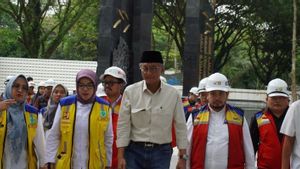JAKARTA - Delegations from the United States and China are scheduled to attend a summit on the "responsible" use of artificial intelligence (AI) in the military this week in the Netherlands. This is the first meeting of its kind so far.
While it's not clear that the 50 countries attending will agree to support the weak statement of principles drafted by the Netherlands and co-host South Korea, the conference is being held as interest in AI more broadly is at an all-time high thanks to the launch of the two-month OpenAI ChatGPT program. Then.
Organizers did not invite the Russian Federation due to the conflict in Ukraine, which will be the main topic of discussion at the summit taking place from 15-16 February in The Hague.
"This is an idea whose time has come," Dutch Foreign Minister Wopke Hoekstra told members of the foreign press ahead of the event.
"We are taking the first steps in articulating and working towards the responsible use of AI in the military," Hoekstra said.
The event may be a first step toward one day developing an international arms treaty on AI, though that looks a long way off.
Leading countries have so far been reluctant to agree on any limits on its use, fearing it might harm them.
About 2,000 people including experts and academics attended the conference in addition to the summit, with topics of discussion including killer drones and killing bots.
U.S. Department of Defense will discuss where they see potential for international cooperation at a presentation on Thursday, 15 February.
A spokesperson for the Chinese Embassy in the Netherlands referred to a position paper in which China underlined the need to avoid "strategic miscalculations" with AI and to ensure it does not accidentally escalate conflict.
SEE ALSO:
UN member states included in the 1983 Convention on Certain Conventional Weapons (CCW) have been discussing possible restrictions on lethal autonomous weapons systems - which can kill without human intervention - since 2014.
Hoekstra said the summit would not replace that debate but would look at other aspects of military AI.
Examples include definitions of terms, how AI can be used safely to accelerate decision making in military contexts, and how AI can be used to identify legitimate targets.
"We are moving into areas that we don't know about, for which we don't have guidelines, rules, frameworks or agreements. But we will need them sooner rather than later," said Hoekstra.
The English, Chinese, Japanese, Arabic, and French versions are automatically generated by the AI. So there may still be inaccuracies in translating, please always see Indonesian as our main language. (system supported by DigitalSiber.id)


















